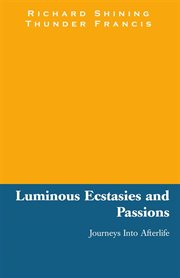Nonfiction
eBook
Details
PUBLISHED
Made available through hoopla
DESCRIPTION
1 online resource
ISBN/ISSN
LANGUAGE
NOTES
Richard Shining Thunder Francis was born March 1, 1952. When he was four, his family converted to the Jehovah's Witness cult, and he now describes this as "the most important and educational event in my life. " He says, "Being a Witness until I was in my early twenties taught me many crucial core-lessons about religion and psychology. It is helpful to observe people operating erroneously, in order more directly to clarify, by contrast, a better way of life. " When he was about twenty, Francis experienced a series of rapid, dynamic, radical shifts into an entirely new area of consciousness. In this state, he felt suffused by a Love so bottomless, so tranquil, so compassionate, and so omnipresent that it changed his life forever. After this illumination, he came to reject the image of God as jealous, violent, psychotic, or angry. He turned away from the ancient vision of God as a tribal war-god, who "belonged" only to his "chosen people". Francis rejected the idea of "Armageddon"-- the belief that God, very soon, is going to massacre the entire human race, except those who have joined the cult. "No more anti-human doctrine can be imagined. Jehovah will make Hitler's concentration-camps look like Sunday picnics in the park," notes Francis. He came to believe, by contrast, that God was Love itself, and that Love was God. Out of love and compassion for others, he wrote down his experiences and thoughts in a book, Jehovah Lives in Brooklyn: Jehovah's Witnesses as a Model of Fundamentalism. His wish: that his book can help others avoid the "black hole" of falling into a mind-controlling minority-religion, where they will waste much time and energy, and lose other valuable and precious components of their lives. "Joining such a group is dangerous to your mind," says Francis. "In the longer term, it can destroy your most prized friendships, and tear apart even your family. I've seen it happen over and over again. " Francis does not hate Jehovah's Witnesses, nor does he take a common route of trying to beat them to death with the Bible. He is unconcerned with "disproving" their technical dogmas, and "proving" alternatives. Instead, he takes an overall psychosocial view of the cult, analyzing how behavioral and psychological changes transform one from a functional, independent man or woman into a servant to an international publishing empire-- all in the name of God. Jehovah's Witnesses distribute many books and magazines recycling their dogma and propaganda as part of their "worship. " He reveals many "secrets" known only to members. For example, he notes that the Witnesses are so zealous in their sales-work because they really believe that God will kill them and their families if they do not sell the books and magazines written and published by the JW Organization. This is only one example of stunning revelations. He also describes how Jehovah's Witness converts come to believe in a world similar to that of the Middle Ages, where psychological and other problems are literally believed to be caused by "evil spirits. " He discusses the place of such rabid superstitions among the Witnesses, and details his own liberation from such radical misperceptions. Unlike other authors, Francis has no "alternative religion" to which he wishes desperately to "convert" his readers. Francis himself "belongs" to no organized religion. He says, "The alternative to the cult-psychology of these groups is not found in the 'frying pan into the fire' strategy of joining another cult or restrictive religion. The alternative that really works is freedom. This is simple: It is just learning to live a good life, a life of compassion, service, friendship, and good works. It is the real and regular practice of Love that can liberate people. It is spirituality. Spirituality is what you do on the inside, while religion is merely what you do on the outside. " Spirituality, Francis believes, is not just the memorization of texts, Scriptures, doctrines, or do
Mode of access: World Wide Web







